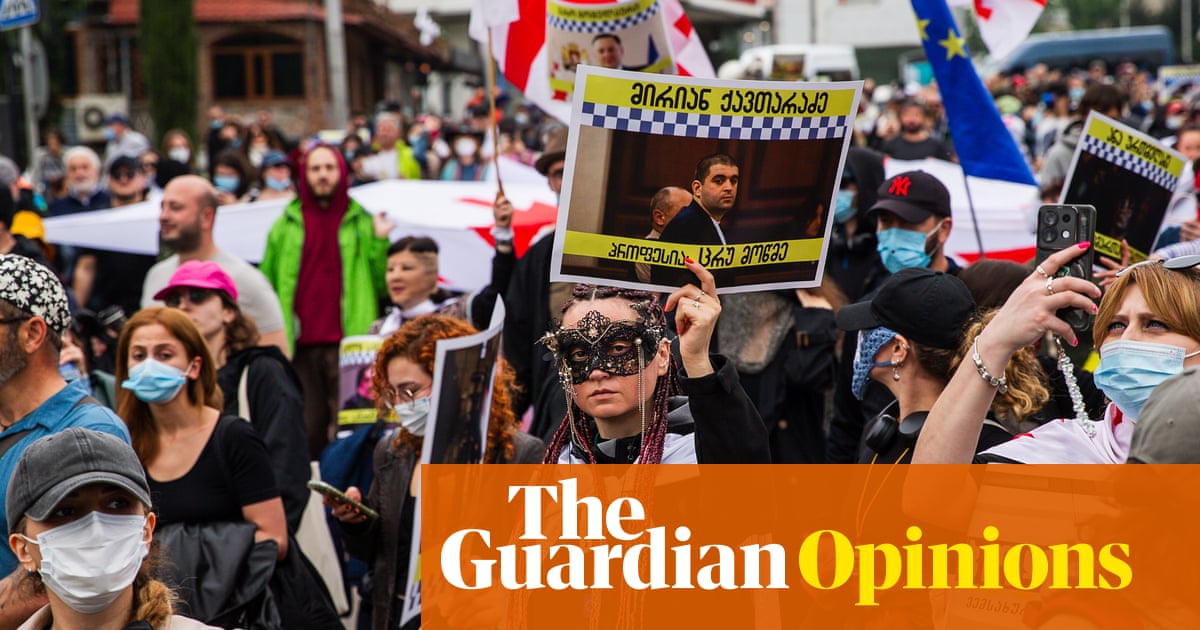“Courage is seeking the truth and speaking it,” Jean Jaurès, the French philosopher and Socialist party leader,told a groupof high school students in 1903. “It is not yielding to the law of the triumphant lie as it passes, and not echoing, with our soul, our mouth and our hands, mindless applause and fanatical jeering.”
When the first world war reared its ugly, pointless head, Jaurès refused to give in to mindless fanaticism and attempted to coordinate a Franco-German general strike to stop the rush to war. In 1914, he paid for those efforts with his life when a 29-year-old French nationalist shot him twice in the back.
Courage among ordinary people is not in short supply. The doctors and humanitarian workers who rush to war zones and refugee camps to care for those who need it. Rümeysa Öztürk, the PhD student who wasarrestedin the US for voicing an opinion against the relentless bombing of Gaza. Israeliconscientious objectorsand an increasing number ofother refuseniks. The protesters inTbilisi,BelgradeandIstanbulwho have repeatedly faced down their governments’ attempts at repression.
Examples of political courage from those in power, though? These feel less numerous. Volodymyr Zelenskyy has displayed it endlessly. French judges did too, when theyupheld the rule of law– which in normal times would simply be doing their duty, but in our times meant facingdeath threats. Pope Francis pushed reforms of the Catholic church to make it more compassionate and inclusive, and didn’t veer from them. He didn’t “change strategy” when attendance failed to pick up, because he didn’t have a strategy – he was simply doing what was right.
On the other hand, we’ve witnessed so many high-profile examples of political cowardice in recent months that I can only talk about them in broad categories. TheUS supreme court justiceswho, last summer, bent over backwards to create a monarchical presidency with impunity to break the law as it desires. The law firms that haveoffered uphundreds of millions of dollars’ worth of pro bono work to an administration busy dismantling the rule of law.
The CEOs and companies that have turned on the money tap and tripped over themselves tocancel inclusion initiativesto placate a president who is tanking their share prices. An almost comically conspicuouslevel of grift,alleged corruptionandinsider trading. Congressional Republicans who have sold out their country’s constitutional principles in order to avoid primaries – or perhaps, as the senatorLisa Murkowski put it, because “we are all afraid … because retaliation is real”.
What is just? Who is acting with honour? With courage? When did we stop thinking it normal to consider such questions – and to demand those things from the people who lead us? To demand that they, well,lead?
Left with basically no other choice, Harvard University finally made thedecision to opposethe Trump administration’s outrageousdemands. That is not to downplay the moral courage in the decision; other universities might have and did make different choices when they were in the same bind. As a result of Harvard’s stand,hundreds of college and university presidentshave decided that sticking together is better than falling one by one.
But perhaps in this moment, Harvard and other elite schools like it might take the opportunity to reflect on exactly what kind of virtues they have been instilling in their students. For years,nearly halfof Harvard’s graduates have stepped straight from campus into roles at consulting firms and investment banks. It’s disheartening but perhaps not surprising, given that according to its newspaper, the Crimson, for the past four decades far more first-years have been concerned with “being well-off financially” than with “developing a meaningful life philosophy”.
When the primary metric becomes “success” in amassing something – money, followers, territory, votes – society loses its moral centre. As Pankaj Mishra wrote in his 2017 book, Age of Anger, part of the crisis of the current moment is that commercial society has unleashed individuals who are unmoored from each other or from some greater social fabric.
It may sound quaint, almost conservative, to denounce a breakdown in society’s engagement with morality in public life. But I reject that. Without an ability to think and speak in real moral language, we end up in a place where there is no more shame in hypocrisy, no dishonour in rapacious greed; where if something is true or false matters less than how many people believe it. We end up in a place where the world’s wealthiest man has overseen a series ofdevastating aid cutsthat will indirectly kill hundreds of thousands of children and sentence millions more to death from disease. There is an appropriate descriptive word for that: the word is evil.
Sign up toThis is Europe
The most pressing stories and debates for Europeans – from identity to economics to the environment
after newsletter promotion
Much of the media – US media, most certainly – have a lot to answer for in the ways that they have oriented public conversation. Far too frequently, they have approached politics primarily as a horse race. What does this or that mean for a candidate’s electoral chances? How will it play out in the polls? Who is up, who is down? Who agrees, who disagrees, and what is each party saying about the other? What the media don’t like to do, because it’s far more difficult and far riskier, is to talk about whether the policies being proposed and the decisions being taken are morally commendable, just, honourable, courageous.
A focus on speaking the truth, of the kind that Jaurès extolled, opens wide other doors. Among them, the ability to move from a political question – what do we want? – to a more courageous one: is this what weshouldwant?
Alexander Hurst is a GuardianEuropecolumnist
